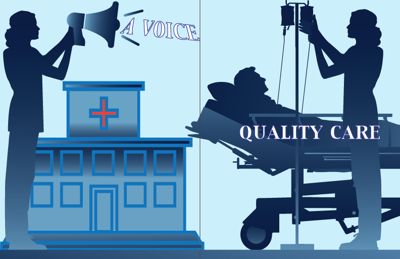LACONIA — Nurses at Concord Hospital-Laconia made history Thursday morning when they filed with the National Labor Relations Board to organize, setting the stage for a union election.
They’re the first private hospital registered nurses to file for an election in New Hampshire, and would also be the first to win one.
“It’s a huge accomplishment, and they deserve all the credit, because they did all the work,” Rich Gulla, president of SEA/SEIU Local 1984, said Friday morning. “This would be a huge deal for the state of New Hampshire.”
The SEA/SEIU Local 1984 petition to the NLRB seeks representation for 148 registered nurses at Concord Hospital-Laconia. Nurses are, reasonably, nervous about potential retaliation.
“Once you file, that’s a protected activity,” said Alex Attilli, associate counsel for SEA/SEIU 1984.
“The hospital’s Laconia campus serves a vital role in providing care to residents across the Lakes Region. Nurses there have expressed concerns about staffing shortages, burnout, and the need for more support in delivering quality care,” a union press release reads, in part. “Union representation would give them the ability to collectively bargain for the resources and respect they need to do their jobs effectively.”
Hospital leadership said Friday they're committed to listening to and engaging with their staff, to ensure their voices are heard.
"Our current shared nursing governance model provides a structured environment of teamwork and flexibility that is essential to nursing," Public Relations Coordinator Genevieve Armstrong wrote. "Our main focus remains providing the high-quality care on which we pride ourselves and serving our neighbors throughout the Lakes Region."
Nurses in Laconia were motivated primarily over concerns for patient safety and, also to a significant extent, their inability thus far to secure a legitimate voice in the workplace.
“This is the best way they can do that, by forming a union and having a seat at the table,” Gulla said.
“The rubber met the road, the gas pedal has been pressed, and they’re cruising.”
The path forward
The legal process begins now — following a two-month procedure whereby nurses had to garner the support of at least 30% of their peers, they submitted their petition and associated documents with the NLRB and noticed hospital leadership. Nurses declined to share with The Daily Sun how many cards were gathered. Nurses interviewed by The Sun for this story are identified with pseudonyms, to guard against potential retaliation.
"It's exciting to see nurses supporting each other to stand up for our licenses and what's right for our patients. We are professionals, but we're also only human," Daniel Blachly, a nurse in Laconia, said. "We can only give so much care as an individual nurse. It took union talk to get leadership to listen to our concerns, which is likely only temporary, to placate us."
NLRB agents will seek an election agreement between the hospital and the union, and set the date, time and location for balloting. The ballot language and a method to determine who is eligible to vote are also part of an agreement. Once such an agreement is reached, an NLRB regional director will hold a hearing, and may order an election and set conditions.
“If successful, this organizing drive could open the door for health care workers in other private hospitals across New Hampshire to pursue union representation and improved working conditions,” the union release reads.
Gulla said Friday he anticipates a two- to three-month process leading up to an election. An election is successful if 50% plus one of the nurses who show up to a vote affirm the creation of a union. Organizers are optimistic they’ll engage in a “seamless, democratic process.”
Nurses on the Laconia campus are required to attempt to reconcile with the hospital, which they did a week before filing. The hospital chose not to respond over seven days.
After filing, there’s a period for objections, responses and negotiating the terms of an election.
“We have tried other avenues, but nobody listens,” Blachly said. “We are at our wits' end.”
The effort at Concord Hospital’s Laconia campus comes less than a year after registered nurses at the Concord campus made progress with organizing efforts of their own. But it’s the nurses in Laconia who were the first to reach the historic milestone.
They started circulating cards June 13, and, two days later, Chief Operating Officer Mary Bakken — one of two members of leadership who penned a letter Nov. 14, 2024, to hospital-based RNs at the Laconia and Franklin campuses encouraging them to consider options other than forming a union — was apparently let go.
Armstrong said the timing of Bakken's departure was not related to organizing efforts, but was part of a restructuring of their senior management team, required to ensure they're agile and patient-focused. That decision reflects their commitment to aligning leadership with the clinical environment, ensuring resource remain focused on patient care, Armstrong wrote.
“We’re a group of very persistent people, we’re a close-knit group,” Teresa Vaughn, a nurse at the hospital, said Thursday night.
Their effort, while quick and effective, didn’t come without difficulty. Concord Hospital contracted with The Crossroads Group, who came to the Laconia campus to hold education sessions in an attempt to dissuade organizing efforts there. The Crossroads Group, based in California, has been contracted by hospitals across the country to quell union organizing efforts at great expense.
"Just as unions engage the services of paid organizers to meet with employees to educate them about union organizing issues, Concord Hospital Health System similarly engaged consultants to help educate our employees, as we feel this is a very important topic and decision and want to ensure our employees are able to make a fully informed decision as to whether they want to pay for third-party representation," Armstrong wrote when asked why the hospital engaged Crossroads' services.
Tensions between leadership, nurses
On two occasions, SEIU organizers delivered pizza — Domino’s, by the way — to nursing staff at the hospital in Laconia. Granted, union employees left flyers with contact information and general information regarding unions and the organizing process with the pizza, but it was Melissa Golightly, an administrative director, who confiscated the pizzas and apparently threw them away.
In an act of subtle defiance, some nurses in Laconia hid pizza in a refrigerator, and left a note that read “too late.”
The pizza affair occurred on Independence Day weekend — hospital leadership brought in The Crossroads Group for education sessions the following Wednesday.
Similar to what was previously expressed by nurses in Concord, nurses at the Laconia campus are primarily concerned with patient safety. During the depths of the COVID pandemic, nurse-to-patient ratios were low, and that hasn’t changed in the years since. The situation brings about real challenges for nurses, and degrades the experience and outcomes of patients.
“It was the pandemic,” Vaughn said. “You just did what you had to do.”
Patient-provider ratios are a big deal. As one nurse put it, when the ratio is too extreme, “you miss critical things.” It also causes knock-on effects, like patients who could otherwise be placed into rooms on upper floors of the hospital languishing in emergency department rooms for lack of staff upstairs. It’s not that there aren’t enough beds on floors more appropriate for those patients, but there aren’t enough nurses to attend to them, so they’re stuck in “hospital purgatory” in the meantime, constraining the ED.
Nurses feel overworked, underpaid and ignored when voicing their concerns — most of all, they see no change on the horizon unless they take definitive, informed action to improve their workplace conditions.
“I’d stay forever if they got to a 4:1 ratio, but that’s not going to happen,” nurse Eric Fisk-Sturtevant said.
Shared governance
Nurses look favorably upon a shared-governance model, but insist it should be from a position of equality, not subordination. Their effort involves nurses from all areas of the hospital.
New Hampshire state law provides a mechanism for shared governance. According to RSA 281-A:64 subsection III, every employer of 15 or more employees “shall establish and administer a joint loss management committee composed of equal numbers of employer and employee representatives.” If workers are represented by a union, the union selects employee representatives.
That committee is tasked with meeting regularly to develop and implement workplace safety programs, alternative work programs, and programs for continuing education on workplace safety. Employers subject to those requirements are also placed on a list for “early and periodic safety inspections,” and are required to comply with directives resulting from those inspections.
And safety is of principal concern to nurses at Concord Hospital. One described emergency department staff as “overworked, underpaid, understaffed,” and said the environment is “total chaos.” Organizing to represent their interests and express their concerns is their best path forward, they said.
“Will that make it better? I don’t know. We’ll see, but we’re at that point,” nurse Sarah Alvadore said, noting the ED is the doorway to the hospital. “Everybody looks like they just got their ass kicked, that’s a typical day.”
It’s their dedicated coworkers, who work tirelessly to support each other and fight for the best interest of their patients, who keep them clocking in, day after day, Alvadore said.
“We want to stay in our community hospital, but we want more of a voice,” Fisk-Sturtevant said. “We have been pushed to our limits.”
“I have never in my life worked anywhere where I felt so replaceable,” Blachly said.


















(0) comments
Welcome to the discussion.
Log In
Keep it Clean. Please avoid obscene, vulgar, lewd, racist or sexually-oriented language.
PLEASE TURN OFF YOUR CAPS LOCK.
Don't Threaten. Threats of harming another person will not be tolerated.
Be Truthful. Don't knowingly lie about anyone or anything.
Be Nice. No racism, sexism or any sort of -ism that is degrading to another person.
Be Proactive. Use the 'Report' link on each comment to let us know of abusive posts.
Share with Us. We'd love to hear eyewitness accounts, the history behind an article.